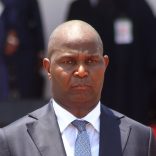Samia assures Mozambique of Tanzania’s commitment to strengthening bilateral ties
‘Hidden debts’: Privinvest no longer seeking to involve Nyusi in London trial – AIM

FILE - For illustration purposes only. [File photo: AIM]
The Abu Dhabi based group Privinvest has given up its attempts to force Mozambican President Filipe Nyusi to testify in the London High Court in the case of Mozambique’s “hidden debts”.
Privinvest alleged that Nyusi had accepted its bribes (though it claimed, laughably, that these were legitimate payments for Nyusi’s political campaigning in 2014, and so did not constitute bribes).
Since Nyusi had supposedly benefitted from the “hidden debts” money, Privinvest argued that Nyusi should be held jointly liable, if Privinvest is found guilty.
In a ruling given on 4 September, High Court Judge Robin Knowles decided that Nyusi enjoys immunity while he is a serving Head of State, and so cannot be tried in the “hidden debts” case.
Knowles noted that the acts of which Privinvest accused Nyusi were committed before he became President and were “not in his public capacity or part of his official functions”.
Nonetheless, Privinvest appealed against this ruling, and on 29 September the Court of Appeal of England admitted the Privinvest appeal against the immunity granted by Knowles to Nyusi.
But now Privinvest has changed its mind, and no longer wants to put Nyusi in the dock. “We concluded that we are not going to involve President Nyusi”, said Privinvest lawyer Duncan Matthews, cited by the German agency DW Africa.
Meanwhile, the Mozambican state has dropped part of its claim against Privinvest. The London High Court heard on Thursday that Mozambique is no longer suing Privinvest and its Lebanese owner Iskandar Safa for “macro-economic loss”.
The lawyer representing Mozambique, Jonathan Adkin, did not put a figure on these losses, but court documents filed earlier showed that Mozambique had most recently been seeking around 830 million US dollars for macro-economic losses between 2016 and 2018 in relation to the scandal.
In Thursday’s court filing Mozambique’s legal team said the country had dropped part of its claim against Privinvest because of “proportionality” and concerns about Privinvest’s ability to pay if it were found liable.
Cited by the Reuters news agency, Helen Taylor, a legal researcher at the pressure group Spotlight on Corruption, called for transparency and for the publication of a full dossier of evidence.
She said that while the settlement reached between Mozambique and the Swiss UBS group “promises some relief from an unjust debt, it represents a fraction of the costs of this corruption scandal that have been estimated at 11 billion dollars and which have seen ordinary Mozambicans forced into extraordinary levels of poverty”.
The case derives from the illegal Mozambican state guarantees given to the banks Credit Suisse and VTB of Russia for loans of over two billion dollars granted to the fraudulent, security-related companies Proindicus, Ematum (Mozambican Tuna Company) and MAM (Mozambique Asset Management).
The loans were only granted because the guarantees for 100 per cent of the money were issued by the Mozambican government of the day, under the then President Armando Guebuza, and signed by his finance Minister Manuel Chang (currently in a New York prison, awaiting trial for offences connected with the hidden debts).
When the true scale of the loans became publicly known in April 2016, the International Monetary Fund (IMF) suspended its programme with Mozambique, and all 14 donors who gave aid to Mozambique in the form of direct budget support suspended all further payments.
This sent the economy into a tailspin, and the value of the Mozambican currency, the metical, dropped sharply. It has not yet fully recovered. An independent investigation into all these losses, undertaken by the Mozambican anti-corruption NGO, the Centre for Public Integrity (CIP) and the Chr. Michelsen Institute of Norway (CMI) put the true costs of the scandal at over 11 billion dollars.
But that study had a cut-off date of 2019. The losses, due to the depreciation of the currency and the loss of trust in Mozambique by international bodies that had once regarded it as a reliable partner, have continued to accumulate since then.
The London trial is now likely to begin on 16 October – unless Privinvest follows the Credit Suisse example and attempts to reach an out-of-court settlement before then.












Leave a Reply
Be the First to Comment!
You must be logged in to post a comment.
You must be logged in to post a comment.